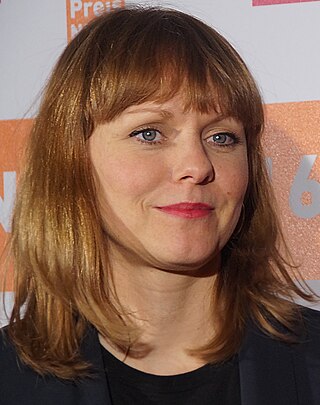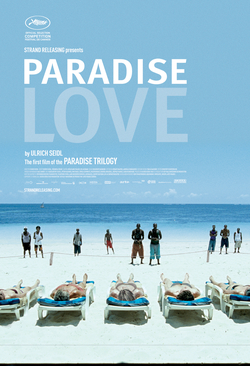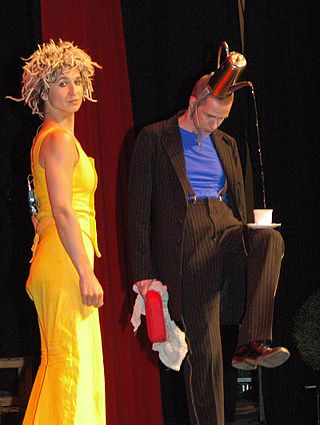
Aki Olavi Kaurismäki is a Finnish film director and screenwriter. He is best known for the award-winning Drifting Clouds (1996), The Man Without a Past (2002), Le Havre (2011) and The Other Side of Hope (2017), as well as for the mockumentary Leningrad Cowboys Go America (1989). He is described as Finland's best-known film director.
The term Paradies may refer to

Nabil Ayouch is a Franco-Moroccan television and film director, producer, and writer. His films have screened at international film festivals including the Cannes Film Festival and Montreal World Film Festival.

Paolo Sorrentino is an Italian film director, screenwriter, and writer. He is considered one of the most prominent filmmakers of Italian cinema working today. He is known for visually striking and complex dramas and has often been compared to Federico Fellini and Michelangelo Antonioni. He has received numerous accolades including a BAFTA Award two Cannes Film Festival prizes, four Venice Film Festival Awards and four European Film Awards. In Italy he was honoured with eight David di Donatello and six Nastro d'Argento.

Dog Days is a 2001 Austrian feature film directed by Ulrich Seidl. The film stars a mix of professional and amateur actors and follows six interwoven stories set in suburban Vienna over the course of some unseasonably hot summer days. The film premiered at the 2001 Venice Film Festival where it went on to win the Grand Special Jury Prize and also won awards at the International Film Festival Bratislava and the Gijon International Film Festival.

The Diagonale is a film festival that takes place every March in Graz, Austria.

Ulrich Maria Seidl is an Austrian film director, writer and producer. Among other awards, his film Dog Days won the Grand Jury Prize at Venice in 2001.

Import/Export is an Austrian drama film by the director Ulrich Seidl from 2007. It was nominated for the Palme d'Or at the 2007 Cannes Film Festival and won the Grand Prix - Golden Apricot reward at the Yerevan International Film Festival. The film was shot in Vienna, Ukraine, Romania, the Czech Republic and Slovakia from 2005 until May 2007 on 16mm film. Simultaneously, the film follows a nurse from Ukraine searching for a better life in the West and an unemployed security guard from Austria heading East for the same reason.

Peter Zeitlinger A.S.C. is a Czechoslovakian-born Austrian cinematographer, who has worked with the director Werner Herzog since 1995. Their film Encounters at the End of the World was nominated for the Academy Award 2009. Peter Zeitlinger studied from 1980 – 1987 at the University of Music and Performing Arts, Vienna. He was influenced by Michael Snow and Peter Kubelka followed by Vittorio Storaro, Sven Nykvist and Vilmos Zsigmond. Zeitlinger's films have received considerable critical acclaim and achieved popularity on the art house circuit. He is represented by the Gersh Agency and is a member of the German Film Academy. Peter Zeitlinger is Professor of Cinematography at the University of Television and Film Munich. He lives in Premariacco, Friuli, Italy.

Maren Ade is a German film director, screenwriter and producer. Ade lives in Berlin, teaching screenwriting at the Film Academy Baden-Württemberg in Ludwigsburg. Together with Janine Jackowski and Jonas Dornbach, she runs the production company Komplizen Film.

Paradise: Love is a 2012 drama film directed by Ulrich Seidl. It tells the story of a 50-year-old Austrian woman who travels to Kenya as a sex tourist. The project is an Austrian production with co-producers in Germany and France. It is the first installment in Seidl's Paradise trilogy, a project first conceived as one film with three parallel stories.

The 69th annual Venice International Film Festival, organized by Venice Biennale, took place at Venice Lido from 29 August to 8 September 2012. The festival opened with the Indian director Mira Nair's The Reluctant Fundamentalist, and closed with the Out of Competition film The Man Who Laughs, directed by Jean-Pierre Ameris. Terrence Malick's film To the Wonder was met with both boos and cheers from critics at its premiere.

Ludwig Wüst is an Austrian film director, scriptwriter and producer.

Paradise: Faith is a 2012 Austrian drama film directed by Ulrich Seidl, the second in his Paradise trilogy. The film was nominated for the Golden Lion at the 69th Venice International Film Festival and won the Special Jury Prize. It won the award for best sound design at the 26th European Film Awards.

Paradise: Hope is a 2013 Austrian drama film directed by Ulrich Seidl, the third in his Paradise trilogy. The film premiered in competition at the 63rd Berlin International Film Festival. It was screened in the Contemporary World Cinema section at the 2013 Toronto International Film Festival.

Nadja Sieger is a Swiss comedian, singer, writer, actress and producer, better known as Nadeschkin of the comedian duo Ursus & Nadeschkin.

Coproduction Office, founded in 1987, is composed of four production divisions in Berlin, Paris, Copenhagen and London, and an international sales company, all specialised in Auteur Cinema. Coproduction Office’s founder Philippe Bober has produced forty films to date with twelve of these having been selected to screen in Competition in Cannes, winning two Golden Palms: Triangle of Sadness and The Square both by Ruben Östlund.
Veronika Franz and Severin Fiala are an Austrian filmmaking duo. Fiala is the nephew of Franz and her husband, filmmaker Ulrich Seidl. Franz, a former film journalist, began her film career co-writing with Seidl. Franz and Fiala began their creative partnership writing and directing Kern (2012), a documentary about the actor Peter Kern. They went on to gain international notice for their feature debut, the German-language psychological horror film Goodnight Mommy (2014), which was selected as the Austrian entry for the Best Foreign Language Film at the 88th Academy Awards.

Rimini is a 2022 drama film directed by Ulrich Seidl. It depicts Richie Bravo, a once-famous Austrian pop singer who has settled in Italy, as well as his estranged daughter and his retired father. Hans-Michael Rehberg plays the father, in his last film role. The film is the first in a diptych; the other film, Sparta, is about Richie's brother, Ewald. Rimini premiered at the 2022 Berlin International Film Festival.

Sparta is a 2022 drama film directed by Ulrich Seidl. It depicts an Austrian man named Ewald who is a non-offending pedophile and teaches judo to boys in Romania. The film is the second in a diptych; the other film, Rimini, centres on Ewald's brother.


















